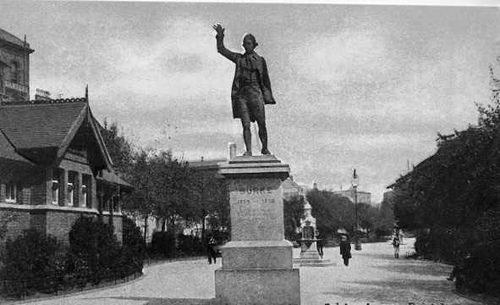SOUTH BEND, IN. Edmund Burke’s reputation has suffered much among conservatives during the past few years. Russell Kirk, of course, held him up as an exemplary genius of the conservative mind, championing above all the spirit of the “moral imagination.” Kirk thus began a deepening and rehabilitation of a weeping prophet of the modern state. But Alasdair MacIntyre, whose understanding of the nature and necessity of tradition as the terrain of rational inquiry is far more nuanced and powerful than was Burke’s, identified the Anglo-Irish statesman with the imminent death rather than the plausible defense of tradition. Davey Henreckson quoted MacIntyre to this effect the other day: when “a tradition becomes Burkean, it is always dying or dead.”
MacIntyre’s reasons for making this claim are worth exploration in greater detail than I can offer here; in brief, they stem from the moral philosopher’s interest in showing that tradition is, again, the necessary terrain on which human reason operates. Association with Burke would tend to obscure the philosophical truth of that claim by making MacIntyre sound merely like a defender of European aristocratic society. A compelling definition of tradition itself, not the conservative Whig tradition, is what MacIntyre seeks to vindicate. Thus, MacIntyre’s understandable effort to explain why his arguments are not reducible to Burke’s has had what I take to be the unintended consequence of making Burke seem less relevant to conservatism and to serious reflection on the nature of politics than indeed he should.
I have spent much of the last three weeks teaching Burke’s Reflections on the Revolution in France to my undergraduate students at Villanova, and have been marveling at the perspicuity, wisdom, and prophecy of that book. And so it came as an unwelcome surprise to find its spirit damned with praise by David Brooks in his column, “Obama’s outsized ambitions.” Brooks’ argument runs along fairly intuitive lines. As a young undergraduate, he read Burke’s Reflections and found that
Burke argued that each individual’s private stock of reason is small and that political decisions should be guided by the accumulated wisdom of the ages. Change is necessary, Burke continued, but it should be gradual, not disruptive. For a young democratic socialist, hoping to help begin the world anew, this seemed like a reactionary retreat into passivity.
Brooks’s experiences, however, led him to see Burke as wise rather than cynical, and as part of an intelligible school of such “gradualists”:
These experiences drove me toward the crooked-timber school of public philosophy: Michael Oakeshott, Isaiah Berlin, Edward Banfield, Reinhold Niebuhr, Friedrich Hayek, Clinton Rossiter and George Orwell. These writers-some left, some right-had a sense of epistemological modesty. They knew how little we can know. They understood that we are strangers to ourselves and society is an immeasurably complex organism. They tended to be skeptical of technocratic, rationalist planning and suspicious of schemes to reorganize society from the top down.
He offers us this candid account of his conversion to “conservatism” in order to explain his pause in the face of the “outsized”-one might say monstrous-ambitions of the Obama administration to reengineer nearly every aspect of public, economic, and institutional life in one fell policy swoop. Evidently, Brooks finds the totalizing ambition of Obama cause for something other than immediate jubilation; he thus takes the following line from Obama as a text for meditation: “We cannot successfully address any of our problems without addressing all of them.”
One might say in response to all this, “so far, so good.” Brooks sets forth one generally recognized conservative principle: the natural limitations of the human reason, and the consequent necessity of prudence and gradual, intergenerational wisdom as the means of checking our over bold ambitions while humbling and guiding those that we must pursue in the face of present discontents. Brooks thus greets the “top down” plan to “reorganize society” with some apprehension; he fears Obama is too bold; he hopes it all works out as planned (to the extent that it really is “planned”), but feels a constitutional resistance to the very attempt.
This amounts to what James Kalb, in The Tyranny of Liberalism, calls “simple conservatism”: a diagnosis of brave ambitions as destructive ones, but with the tacit recognition that, after the deluge, the new status quo will be the new status quo to be defended by the conservative. Brooks sees Obama as moving too quickly toward the reconstitution of American society and notes, incidentally, that perhaps the complete reengineering of that society might be setting the sights a tad too high. Such dynamism and such a megalithic approach to public policy present themselves as constructive-or, reconstructive-but they tend by their hasty ambition to destroy rather than build, Brooks speculates. He presumes he says this as part of the conservative tradition of Burke, and so concludes, “I can’t even root for my own vindication. The costs are too high. I have to go to the keyboard each morning hoping Barack Obama is going to prove me wrong.”
Brooks’s column is brief, and so one can hardly blame him for failing to give us a thorough vision of the conservative spirit to which Burke helped give birth. But the excuse of brevity does not relieve him of the responsibility to mention those other principles Burke articulated that would not simply warn us, “Don’t go too fast!” but would also insist, “Such ambitions are at their core destructive, even demonic.”
It is certainly true that Burke advocated only gradual political change guided by the two principles of conservation and correction. He believed strongly in the virtue of prudence as that which must guide a statesman, and so had little patience with abstract, total declarations of the “rights of man,” when he knew well that political life consists mostly of half-measures that must be judged in terms of their circumstances and effects rather than their abstract righteousness. This is the Burke Brooks has read.
What he has not read or has chosen to ignore is the Burke who offers us something more substantive than “simple conservatism.” Burke saw the French Revolutionaries not as over-hasty, good-hearted geniuses; he saw them as atheistic devils. Does good in the hands of the hyperactive necessarily become an evil? Do its agents?
No, Burke tells us. The modern spirit of change is not simply an accelerated form of the old one. He advises only gradual political change not merely to preserve us from an incautious exultation. He sees, rather, that the modern pretensions of reason that lead some few human persons to believe that they can destroy one order and form a new one by the power of their individual reason is intrinsically evil-not because of its velocity, but because of its nature.
Society requires the wisdom and experience of many generations, Burke writes. This is, in part, due to the fact that no one generation can accomplish the great good that is society. But mostly this is the case because a stable and flourishing society cannot be organized upon merely rational lines. Earthly societies did not come into being as if engineered to follow certain already articulated abstract rights and mechanical principles entirely contained in the mind of a philosophe. They gestate; they are born and mature slowly, like a tree, and must be tended with caution, as must a grape vine. This slow formation stems from the fact that societies are something other than the product of some few, abstract principles, as if a society were to those principles what a room is to the lines on an architect’s blueprint.
The graduated nature of social growth and social change makes possible the essential realities that constitute society. Those realities? Not abstract principles, but bonds of affection. The myriad communities and associations that come into being naturally through the life of people living together are no mere florid ornaments to soften the hard edges of a juridically and bureaucratically constituted society. Just the opposite: the bonds of affection-of love, respect, constraint, interdependence, awe, and obligation-that form naturally among a group of people eventually make possible the elaboration and expansion of that group to what we know as society. Such bonds are multiple; they cannot be brought into being at will, much less engineered “top-down”; and they are fragile and prone to failure. Without such bonds, one does not have a society; one has, at most, a corralled herd of people held in obedience by the pure threat of force from an utterly alien, inevitably tyrannical, state.
The Revolutionaries Burke so loathed insisted on the opposite. They believed society was constituted by a series of simple, rational relations grounded in the idea of “rights.” They believed that the material of this world, including that of human persons, was subject to a purified reason and so could be molded and remolded by force to conform to that reason. And, worst of all, they saw the fragility of the affective bonds that constitute society as a sign of their irrelevance. Society must be built of rational laws; anything less certain, firm, and simple than the abstract eternity of the “rights of man” could not possibly serve as the fabric of which society is woven.
The spirit of modern liberalism was born of such Revolutionaries, and has not tempered their ambitions in the slightest. We have witnessed during the last two generations the accelerated advancement of the Revolutionary project. Increasingly centralized modern states have worked to dissolve, weaken, and at times even destroy those affective bonds that make society possible. Let me repeat: such affective bonds may sometimes make social life a cause for happiness, but they alone make social life possible. Without them, one has a bunch of alienated individuals held together, if at all, by legal constraints and the threat of state force.
Brooks’s plea, as it were, to Obama for caution may seem to operate on Burkean lines. But in ignoring Burke’s defense of society as an essentially hierarchical, infinitely complex, series of affective relationships, Brooks’ call for caution gets interwoven with errors of fact and errors of aspiration.
Early in his column, he observes some of the disheartening spectacles that led him to sympathize with Burke; he had seen, in this age of liberal social engineering, “urban renewal efforts that decimated neighborhoods, welfare policies that had the unintended effect of weakening families and development programs that left a string of white elephant projects across the world.” The adjective “unintended” seems here indefensible. Perhaps Brooks means that the liberal bureaucratic elites, who make policy during Democratic and Republican administrations alike, lack any clear sense of the good at which they nonetheless flail with ambitious policy after policy. In that sense, these things may have been “unintended.”
But let us be clear that there is an evident consensus among those who actually perform bureaucratic and policy-making functions that the traditional bonds of affection that make society possible and bearable must be eliminated, because they stand in the way of efficient, rational reengineering. Urban renewal hurt the poor by moving them, and so isolating them from the bonds of neighborly interdependence that prevented poverty from becoming the stage for anarchy and self-destructive hedonism. But was the moving-and-isolating that resulted in the wide net of modern American suburbs any less destructive? Less dramatic in its violence, certainly, but no less destructive. State-administered welfare programs have certainly weakened poor families almost out of existence-to the point that many poor single mothers turn over most essential aspects of child rearing to social workers, public school teachers, and trained nutritionists with tight budgets. But are the videogame-playing latchkey children of divorce any less isolated, any less poorly initiated into the bonds of affection that make them members of a society or into the virtues that make them good members of it?
The whole tendency of our ever-more-centralized, ever-more-omnipotent State has been toward unbonding society to reform it as a series of ruled, malleable, and mobile individuals. Why does the potential speed of such change during the Obama administration trouble Brooks so much more than its intended outcome?
Brooks may sound more generous of spirit than Rush Limbaugh or Karl Rove when he expresses hope that Obama will prove him wrong. But if the Obama administration’s plans do “succeed,” we will find ourselves significantly closer to a brave new world so robbed of those traditional hierarchical, familial, and social communities and associations social life requires that what remains will be an amorphous mass of free-floating individuals only a liberal could love. And that liberal could only love it from above and afar.
Hence, the sometimes desperate rhetoric of Burke’s Reflections. He was not telling the Revolutionaries or their modern heirs, the Western bureaucratic elite, to slow down. He was telling them to stop and to repent, lest social “change” become social dissolution, and the righteous love of a people for its rulers and for one another be transformed into a massive yet solitary terror before the “law” and an unnatural dependence on its bureaucrats’ power to feed and to destroy.






6 comments
gary amato
Very interesting and thought provoking review. I have several debatable issues with it but will focus on only one for this email. Your comment that Brooks’ statement on welfare policies having the unintended effect of weakening family structures, caught my attention. I’m not sure why this statement is so ‘indefensible’ as you put it. Your example is over reaching a thought that is no more complicated than simply – the intentions of welfare policy were not to defeat the family structure but rather to boost it – or at least maintain it through hardships/strife that, otherwise, an individual/family could not cope with. The intention of the policy could be applied, of course, to the policy maker – that the policy maker intended welfare to, in short, help not hinder the recipient(s). I see a long stretch to conclude that Brooks is possibly suggesting the policy makers don’t understand what’s good or not good. Do you mean presumably because the policy-maker is inherently not good?
Taking my point a step further, there is a direct correlation to the quality of a given policy and the time it takes to develop and implement it. Quality, in this sense, meaning that it does the good it was intended to do and doesn’t create any bad side-effects for lack of a better phrase. Truncating the time for 1) avid debate, analysis of “what-if” scenarios, and 3) extensive research of similar/relevant policy, here and abroad, would have to lead a rational person to conclude you are diminishing the probability of achieving your good intentions and opening up the door to a myriad on unintended consequences (good or bad). Much like the chess player who makes a hurried move only to find out 5 moves later of the dire predicament he/she is in. I’m sure only good intentions existed at the earlier move, – just not very relevant at the later point though.
Perhaps, this is what Brooks is eluding to in his condemnation of moving too big too fast? The process is cumbersome and too complicated for even the geniuses among us to master. Slow is good and assures we uncover more rocks in the process – rocks that may allow us to discover a clue preventing us from annihilating something good, something not broken, something not “unintended.”
Shaun Weaver
Wow; thanks Mr. Wilson. Wish I could have read your comments 10 years ago while I was writing Just A Breat Away but I think I managed to get the essence of what you have said here (albeit somewhat less eloquently)into my novel. Yours thougths on the current socio/polical environment need to be spread far and wide.
BWilson
Do you have any thought on George Bush’s attempt to nation-build abroad? Is it as dangerous as Obama’s plan to nation-build domestically? How does the context affect this analysis, if at all?
James Matthew Wilson
I don’t normally understand the word “moderate,” but I definitely don’t understand its permutation in the above comment — but would welcome explanation and further information on the Burke Institute.
N.P. West
The Edmund Burke Institute has recently formed and is committed to moderate Republicanism. One has to wonder what Burke would think of his name being associated with moderates like George P. Bush and Michael Steele. Is conservatism being bastardized for the sake of political expediency?
Mark Shiffman
Thanks James. I think this is a good illustration of how Brooks has only latched onto a facet of Burke and taken it for the whole. In an earlier discussion of Burkean conservatism, Brooks observes:
“Over the past decade, religious conservatives within the G.O.P. have argued that social policies should be guided by the eternal truths of natural law and that questions about stem cell research and euthanasia should reflect the immutable sacredness of human life.
But temperamental conservatives are suspicious of the idea of settling issues on the basis of abstract truth. These kinds of conservatives hold that moral laws emerge through deliberation and practice and that if legislation is going to be passed that slows medical progress, it shouldn’t be on the basis of abstract theological orthodoxy.”
The equation of natural law with abstract truth (when natural law is what serves as the foundation for prudence and is embedded in emergent bodies of common law precedent) is a profound misunderstanding both of natural law and of its necessary place in Burkean thinking.
Comments are closed.